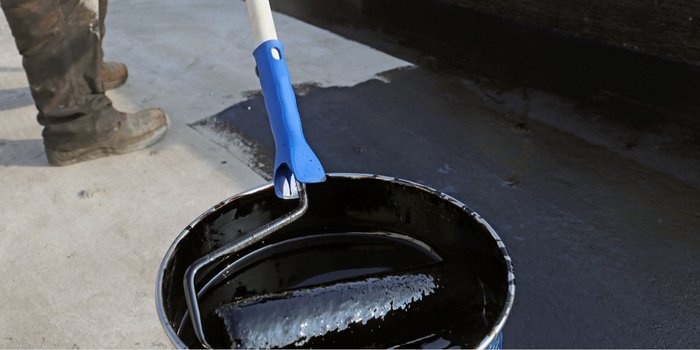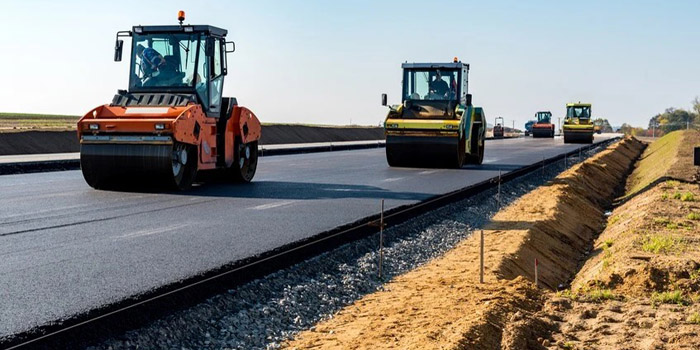Do you want to build roads, repair pavements, or start a new construction project? Then you will probably be confused about what material you can use: asphalt or bitumen.
Actually, these are both the most common materials used in the building process. But they have different compositions, benefits, and durability. Therefore, we have prepared this guide to show you major differences between asphalt and bitumen.
What is Asphalt?
Asphalt is a mixture of crushed stone, sand, and sticky materials. Civil engineers use it to build and repair roads, parking lots, railway paths, airport runways, and play areas.
Asphalt provides smoothness to the road, so you can drive your vehicles safely & comfortably because it can absorb the impact of heavy traffic.

How is Asphalt Made?
It is made from two main parts and is usually made at temperatures of 150-180°C. The first is aggregates, which are a mix of different raw materials. These make up about 95% of the composition. The second part is bitumen that binds the materials.
For More Help: What is Asphalt Made of? Ingredients, Production & Types
What is Bitumen?
Bitumen is a thick, black and sticky material (hydrocarbons). It is made from crude oil. You can use it to grip stones and sand together in road construction.
Basically, it works like binder/glue, which makes your road surface strong and water-resistant too. Further, you can also use bitumen for your house roofing as well as waterproofing projects.

How is Bitumen Made?
It is made from crude oil processing in a factory. When you heat the oil, the thick and sticky part will convert into bitumen. Now, it is ready to use for your roads and construction works.
Difference Between Asphalt and Bitumen
Asphalt and bitumen are widely used for building projects and road construction. But, they both are completely different. The main contrasts are as follows:
| Aspects | Asphalt | Bitumen |
| Composition | Combination of bitumen with gravel and sand | Extracted from cruise oil and no presence of stones & fine gravel |
| Cost | It is costly due to its materials and special mixing equipment | Price can be changed according to quality but it is mostly cheaper than asphalt |
| Road Construction Process | Ready to use after mixing | You need to mix it with other materials |
| Frictions & Fuel Efficiency | Has good holding power and saves fuel | Less grip and less fuel saving |
| Temperature Sensitivity | It is stable in heat and cold | Soft in heat & turn hard in cold |
| Durability | Can last over two decades with proper care | Wears out faster under traffic pressure and weather |
| Surface Smoothness | Provide even surface and give you comfortable ride | It is soft and driving over them will be dangerous for you |
| Applications | Road paving, parking lots, airport runways, footpaths & sports courts | Binder in asphalt for roofs, sealing cracks in buildings |
| Properties | Strong, weather-resistant, recyclable and handle heavy loads | Waterproof, adhesive and important for binding |
| Pavement | Built in layers for stability and load distribution | Apply as a thin coating/ rarely used as the main pavement |
| Environmental impact | Eco friendly and clean production | Produces emissions and is not recyclable |
| Slip resistance | Its rough surface reduce risk of slipping | More dangerous if surface is wet |
| Boiling Point | 400°C to 500°C | 200°C to 525°C |
| Water Solubility | May resist water | Fully waterproof |
| Elasticity | Has limited flexibility | More flexible |
Composition
Asphalt is the combination of bitumen with sand, gravel and stones. You can use it to make strong and smooth roads.
Bitumen, on the other hand, is the black petroleum-based material that acts like glue in asphalt layers. You will find no stones and sand in it.
Price
Asphalt is generally more expensive because it contains bitumen and other materials. Plus, you require special plants to mix it properly.
Bitumen alone will be affordable for you because it is only the sticky material that is used in asphalt. However, the price mostly depends on quality, quantity as well as how it is processed.
Road Construction Process
Asphalt is ready to use when you mix bitumen with stones and sand in a finary. Then, you can lay it directly on the road and press it for a smooth path surface.
While, you cannot use Bitumen alone for road construction. You have to bind it with stones and sand in the asphalt mixture. But, it is still an important part of the road building technique.
Friction & Fuel Efficiency
Due to the stone’s presence, asphalt provides lower friction. In this way, your vehicle can grip the road well. As a result, you can drive safely. Also, your car will consume less fuel on smooth asphalt roads.
From the perspective of bitumen, it is smooth but also sticky. That’s why your vehicles will not have as much grip and fuel efficiency as on asphalt roads.
Temperature Sensitivity
Stones in asphalt keep it stable. This is why it is less sensitive to temperature. You can drive over asphalt made roads even in hot and cold weather. On the other hand, bitumen gets soft in hot and cracks in cold. You must handle it carefully in extreme temperatures.
Durability
Asphalt made a strong thick layer because of quality materials such as rocks and sand. Generally, its layer thickness is 25 to 49mm. Asphalt has a lifespan of 20+ years.
In contrast, bitumen is less durable and easily cracks when it faces traffic. Its layers are usually 10 to 20 mm thick and can last for around 5-10 years.
Surface Smoothness
The mixture of gravel and bitumen in asphalt makes it smooth and even when you drive on it. Hence, you will experience a comfortable ride. But, bitumen is rough and does not provide a smooth surface. It can wear out faster so it is less safe for you to drive on.
Bitumen alone can also make a smooth layer, like in road sealing, but it is softer and may wear out faster or be less safe to drive on.
Applications
You can use asphalt mainly for roads, highways, driveways and airport runways because it can work well for heavy traffic.
Bitumen is only used as a binder in asphalt. You also use it in your buildings to cover roofs, stop water leaks and seal surfaces.
Properties
Asphalt is strong, flexible, good insulator, recyclable, not flammable and can handle high traffic. You can drive on it safely in most weather.
Bitumen is sticky, colloidal in nature, waterproof and serves to hold materials together. It is not as strong as asphalt but is very important for road construction and waterproofing projects.
Pavement
In terms of road pavement layers, asphalt provides strong support for your cars and heavy vehicles. You can drive smoothly because it spreads weight evenly.
Bitumen pavement alone is rare. It is usually used as a thin top layer and coating. Because asphalt pavements last longer and need fewer repairs as compared to plain bitumen surfaces.

Environmental Impact
The process of producing asphalt can release some heat and smoke. But new techniques reduce pollution. Also, you can recycle old asphalt to build new roads.
Well, bitumen production also produces gas and uses oil, which can affect your environment (if not handled properly). Basically, it is made from crude oil, which cannot be recycled once used.
Slip Resistance
Due to the rough texture, asphalt roads provide good grip for tires and shoes. That means, you can drive and walk safely in the rain.
Bitumen is smooth and sticky material, so it can be slippery when wet. It also increases the risk of sliding.
Boiling point
Asphalt has a boiling range between 400°C and 500°C. The presence of stones and sand increases its heat resistance.
However, bitumen boils at a higher temperature than asphalt because it is one of its main ingredients. It vaporizes at temperatures from 200°C to 525°C
Water Solubility
Asphalt does not dissolve in water. The reason is that it is made with bitumen and other tough materials. But it can allow a small amount of water to steep through gaps. Bitumen is completely water-resistant, so it keeps your roads safe in outdoor conditions such as rain damage.
Elasticity
If we talk about elasticity differences, asphalt has limited flexibility. Stones and sand presence make it rigid. Well, it can handle some movement but may crack under the worst traffic jams.
But, bitumen is more elastic and can bend slightly without breaking. In this way, it can easily absorb small road movements.
Advantages and Disadvantages of Bitumen
Bitumen offers you lots of benefits that make it useful for your construction and waterproofing projects.
- It is waterproof, so it can stop water penetration easily.
- As bitumen is very sticky which binds stones and sand during road building.
- It can handle small movements, pressure and has flexibility as well.
- Bitumen is cheaper than asphalt.
- You can easily use it for your building and repairs.
Along with its properties, bitumen also has some drawbacks.
- Bitumen easily softens in high temperatures and hardens in cold.
- It gets damaged fast when many vehicles pass over it.
- Also, it is less durable than asphalt.
- Over time, bitumen can crack easily.
- You have to handle it carefully in extreme weather.
Pros and Cons of Asphalt
Following are some advantages and disadvantages of asphalt.
Benefits of Asphalt
- Smooth surface: Asphalt made roads give a comfortable ride and reduce noise.
- Quick to install: Workers can construct highways and buildings in less time due to its easy installation of asphalt.
- Cost-effective: Usually, asphalt is cheaper than concrete.
- Easy to repair: You can fix damaged parts of the asphalt paths without replacing the whole road.
- Good grip: It provides good grip for your vehicle’s tires.
Downsides of Asphalt
- Can soften in heat: It may get damaged easily in extreme hot weather.
- Needs regular maintenance: You have to do regular checks because it can develop cracks & potholes over time.
- Shorter lifespan: Asphalt also wears out faster than concrete.
- Not eco-friendly: During its productions, asphalt releases gases into the air which are harmful for your environment.
When to Choose Bitumen or Asphalt?
Asphalt or Bitumen? It’s completely based on your project requirements and environment where you use it. For example: you should choose bitumen if you want waterproofing buildings or small repairs. It’s also best for areas which need flexibility.
However, asphalt is your ideal choice for smooth and durable roads that can handle heavy traffic. You can also use it when you need fast and easy installation.
To Conclude
We can say that asphalt has many benefits and only a few drawbacks. While bitumen has more limitations. Asphalt is popular, strong, long-lasting and cost-effective. Bitumen has its own uniqueness like binding power.
Our company JACKWIN has been manufacturing road construction equipment and traffic safety products for the last 18+ years. We are a trusted supplier of asphalt & bitumen materials in China. Talk to our team now for a quick quote.


-80x69.png)

